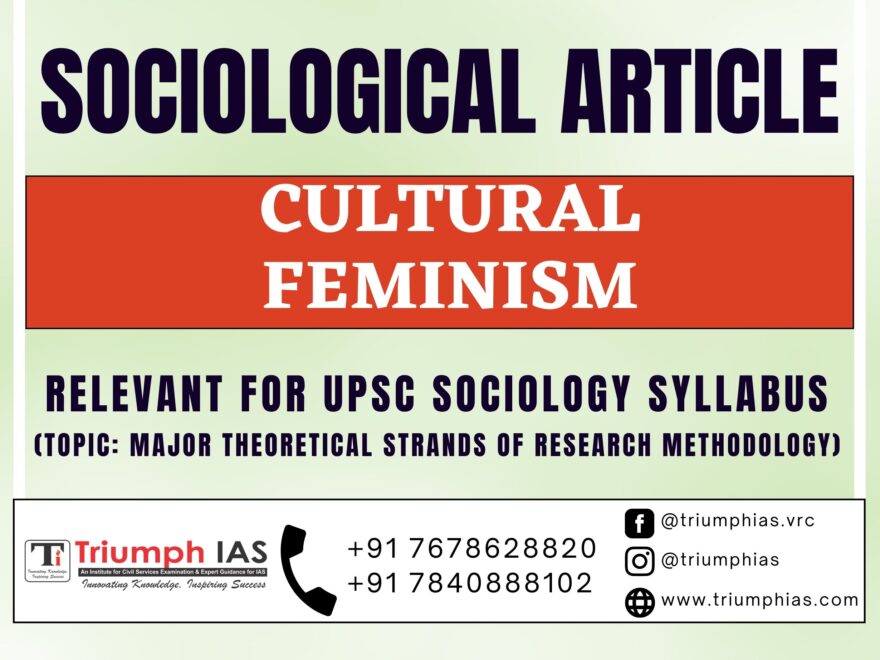CULTURAL FEMINISM
(Relevant for UPSC Sociology Syllabus – Topic : Major Theoretical Strands of Research Methodology)

Cultural feminism is a political and philosophical movement that emerged in the 1960s and 1970s as an offshoot of feminism. It emphasizes the importance of celebrating women’s differences and recognizing the unique contributions that women make to society and culture.
Cultural feminists view gender differences as positive and valuable, and argue that they should be celebrated rather than erased or minimized. They emphasize the importance of valuing women’s traditional roles as caregivers and nurturers, and of recognizing the unique qualities that women bring to social and political life.
One of the key principles of cultural feminism is the idea that women’s experiences and perspectives are distinct from those of men, and that they are shaped by a distinct set of cultural and social factors. Cultural feminists argue that these experiences and perspectives are valuable and important, and that they should be recognized and respected.
Cultural feminists also focus on the importance of cultural production and representation in achieving gender equality. They argue that cultural representation plays a powerful role in shaping our understanding of gender roles and expectations, and that it is essential to create a cultural landscape that reflects women’s experiences and perspectives.
In terms of specific policy proposals, cultural feminists advocate for a range of measures aimed at promoting gender equality and celebrating women’s unique contributions to society. These may include policies that support women’s access to education and the arts, as well as policies that promote equal representation of women in cultural and political institutions.
Cultural feminists also often focus on issues related to language and representation, arguing that language can be used to perpetuate gender inequality or to challenge it. They emphasize the importance of using language that is inclusive and respectful of women’s experiences and perspectives, and of creating a cultural landscape that reflects these values.
Critics of cultural feminism often argue that it is too focused on celebrating traditional gender roles and too quick to dismiss the importance of challenging patriarchal structures and cultural norms. Some argue that cultural feminism ignores the diversity of women’s experiences and perspectives, and that it tends to prioritize the concerns of middle-class, white women.
Overall, cultural feminism represents an important strand of feminist thought that emphasizes the importance of celebrating women’s differences and recognizing the unique contributions that women make to society and culture. By valuing women’s experiences and perspectives, and by promoting equal representation in cultural and political institutions, cultural feminism offers a powerful framework for creating a more inclusive and equitable society.
Radical Feminism: Challenging Patriarchal Structures for Gender Equality
-
Follow us :
🔎 https://www.instagram.com/triumphias
🔎https://www.youtube.com/c/TriumphIAS
https://t.me/VikashRanjanSociology
Find More Blogs
Scope of the subject and comparison with other social sciences
Changing family structure in India Modernity and social changes in Europe
Cultural feminism, gender equality, traditional gender roles, language and representation, social and political life, feminism, women’s rights, gender equality, cultural representation, traditional gender roles#Sociologyforupsc #sociologyforupscinhindi #sociologyforupscgs1 #sociologyforupscprelims #sociologyforupscinenglish #sociologyforupscmainsinhindi #sociologyforupscoptionalinhindi #sociologyforupscmains #sociologyforupscplaylist #sociologyforupsclecture1 #sociologyforupsccse #sociologyforupscoptional #syllabusofsociologyforupscoptional #bestbookforsociologyforupsc #sociologyoptionalforupscanswerwriting #sociologyoptionalforupscanukumari #sociologyoptionalforupscabhijeet #sociologyoptionalforupscanalysis #sociologyoptionalforupscalllectures #sociologysyllabusforupscanalysis


One comment